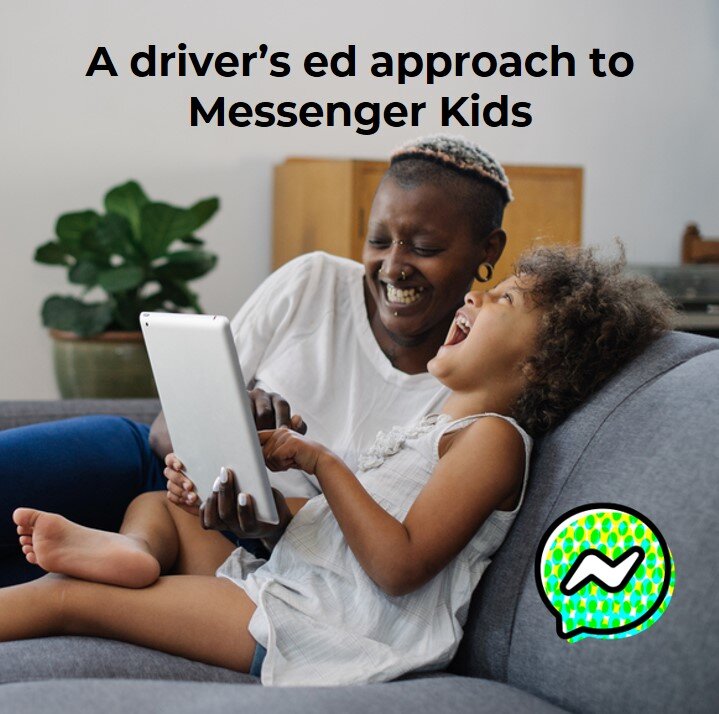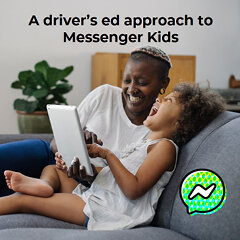


This is likely your child’s first foray into social media and it’s important to equip them for it and to be attentive to potential unexpected side effects.
START recently partnered with the Wall Street Journal to share thoughts about a hot app for kids: Facebook’s Messenger Kids, an introductory social media app designed for kids age 6-12. As kids are unable to connect with their friends in traditional means, it’s natural to explore other alternatives. If you want to go down a social media chat route for your kids, Facebook Messenger Kids is about as safe as it can get. Parents approve each contact so they’re only people you know (your kids can’t find strangers and strangers can’t find your kids), you get a copy of all the messages so you can see what they’re saying, and the messages can’t be deleted (with some exceptions). In some ways, it’s even “safer” than texting, however, as we suggest whenever considering a new app or device, it’s worth thinking not just about safety, but about their digital health.
However, as this is likely their first foray into social media, it’s important to equip them for it and to be attentive to potential unexpected side effects. This app opens the door to addictive design that is implicit with social media apps. Many parents have shared with us that that while there is a honeymoon phase when their kids first connect with friends, this quickly wears off when they see that their child can begin to check over and over for messages, experience FOMO, and feel anxiety that they need to respond immediately whenever someone contacts them. Their young brains don’t have a sufficiently developed pre-frontal cortex to help them resist the impulse to engage.
It’s only natural because our kids need training and some initial boundaries as they learn new skills. One of our START Rules of Thumb is “Ride. Practice. Drive.” Before you hand your child the keys to a car, they spend years shadowing you in the backseat, followed by a learner’s permit – where they get increasing responsibility as they show they can handle the basics.
At START, we want to help parents take a similar approach when helping kids navigate social media. Here are some tips for using a driver’s ed approach to Messenger Kids:
Start slow and small. Maybe first pick one friend and try that for a while. Then consider adding another. Start with just 1:1 chats before moving to group chats.
Teach your kids how to be intentional with their online interactions. Do they want it to be the junk food equivalent of connection – 1,000 emojis back and forth, silly videos of their derriere – or can they experience more thoughtful connection. Coach them on questions they may want to ask their friend or topics that would be fun to discuss. Point them towards an interactive game they can play. These interactive, reciprocal connections cause their brain to release oxytocin, which acts like a Pacman, eating up cortisol, the hormone caused by stress. Focusing on a few, higher quality interactions. They’re more likely to actually leave your child “filled up.”
Be aware that misunderstandings and intentional cruelty can spread easily online and your kids often won’t mention it. As annoying as it may be, it is a wonderful gift that Facebook gives you a copy of all of their messages. We’d recommend scrolling through their messages at least occasionally at first to identify hurts they’ve received or caused.
Be prepared to teach etiquette and establish norms. Texting and video chatting aren’t something they naturally know how to do with common courtesy. When they begin, sit next to them, guiding them through some initial texts or video chats. Teach them to say hello and goodbye, to not abandon one friend without notice when another friend is messaging, teach them to let their friends know they won’t be checking at certain times, etc.
Explore ways to bring screentime to life. Encourage your child to engage with these friends in the analog world as well (e.g., mailing a letter, chalking their driveway, scheduling a family Zoom date).
Check in with your kids about it. Ask them questions like:
How do you feel when you use Messenger Kids? How did you feel today when you used it?
What interaction felt really good?
Did any interactions make you not feel so good?
Have you ever seen someone do something mean on Messenger Kids?
What did you learn about one of your friends today?
Is there anything we can do in our analog world to further that friendship (e.g., mailing a letter, chalking their driveway)?
As parents, it’s a challenge raising happy, healthy kids in an increasingly digital world – even when we’re not in the midst of a pandemic! Check out our social media and other resources to learn more tips and tricks for increasing your digital health.